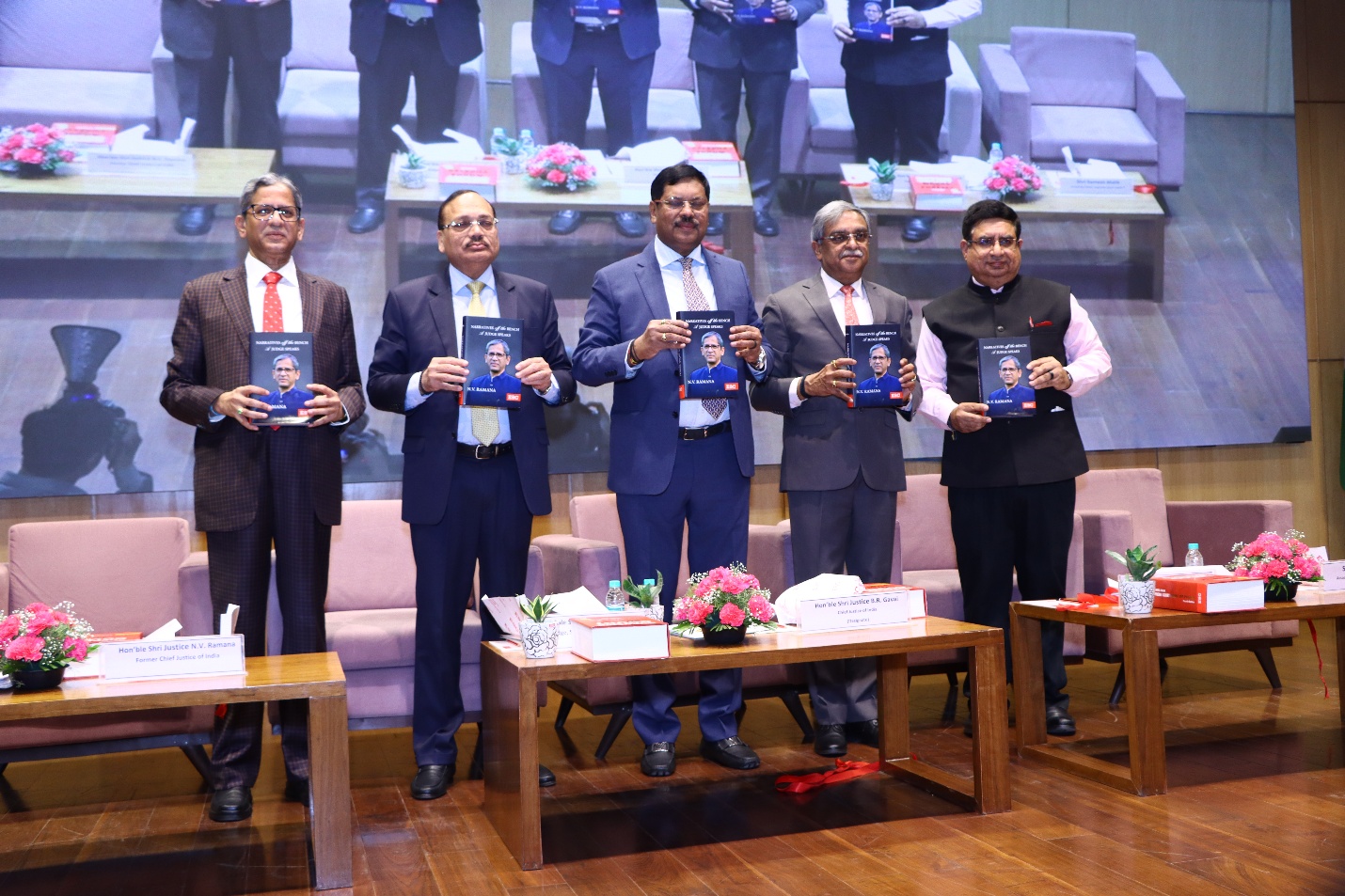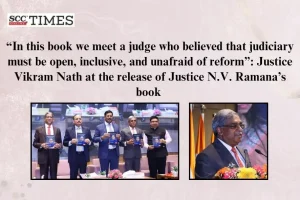On 7-05-2025, a momentous event was held at the Delhi High Court to celebrate the release of the book Narratives off the Bench: A Judge Speaks. This book, a compilation of speeches by Justice N.V. Ramanna, the former Chief Justice of India offers valuable insights into his judicial philosophy and contributions to the legal landscape. The event was organized by Eastern Book Company (EBC) and attracted a distinguished audience, including Justice B.R. Gavai, Chief Justice of India (Designate), Justice Suryakant, Judge, Supreme Court and Justice Vikram Nath, Judge, Supreme Court. The ceremony was attended by over 400 people, including judges from various High Courts across India, including the Supreme Court, Delhi High Court, Telangana High Court, Andhra Pradesh High Court, Allahabad High Court, and Madhya Pradesh High Court. The event also saw the participation of prominent legal professionals, senior advocates, and members of the legal community

The event was opened by a speech delivered by Justice Vikram Nath, who expressed his privilege in being part of the book launch and emphasised the significance of the work compiled in the book. Justice Nath began by recalling a personal message he had received from a friend outside the legal profession, which aptly described Justice Ramanna’s persona and his approach to the judiciary. The message praised Justice Ramanna for instilling a “breath of fresh air” in the Indian judiciary and restoring public faith in the system through his sober and principled leadership.
Justice Nath further highlighted that the book was not merely a personal memoir, but a profound compilation of judicial reflections formed within the framework of constitutional responsibility. It serves as a public record of Justice Ramanna’s many roles—judge, thinker, reformer, mentor, and above all, a citizen deeply committed to upholding the values of the Indian Constitution.
In his address, Justice Vikram Nath elaborated on some of the major themes presented in the book. One of the striking features, he noted, was Justice Ramanna’s deep reflections on the Constitution of India. Justice Ramanna reiterates the idea that no instrumentality of the state, be it the executive, the legislature, or the judiciary is superior to the other. All are co-equal, each depending on the support and cooperation of the others. This was emphasised as a reminder of constitutional balance, not only on paper but in actual practice.
Justice Nath highlighted that Justice Ramanna’s vision for the judiciary extends beyond theoretical legal concepts. In his book, he viewed the Constitution not as a mere set of rules but as a living document that must be brought to life through practical and thoughtful application by all those in positions of responsibility. Drawing on the words of Dr. B.R. Ambedkar, Justice Ramanna emphasised that while the Constitution may be good, its success hinges on the integrity of those who implement it.
Another notable aspect of Justice Ramanna’s speeches, as discussed by Justice Nath, was his focus on judicial infrastructure. Justice Ramanna has been a staunch advocate for modernization and digitization in the judiciary, acknowledging the gaps in the system while advocating for significant reforms. He proposed the creation of a National Judicial Infrastructure Corporation, aimed at standardizing and enhancing judicial infrastructure across the country to meet the needs of the justice system. However, even in the pursuit of these reforms, Justice Ramanna has consistently placed the litigant, the justice seeker, at the center of his vision.
“Taken together, these speeches offer us not only an institutional archive, but a map of conscience, they show us that a judge can speak not just through judgements but through persuasion, through encouragement, and through reflection” – Justice Vikram Nath
Justice Nath also spoke about Justice Ramanna’s ongoing advocacy for gender justice and the inclusion of women in the legal system. He pointed out that Justice Ramanna’s reflections go beyond mere symbolic gestures; they call for tangible structural changes.
“Some of the most impactful portions of the book are his speeches on women in the legal system. He speaks with a purpose, he knows how many women lawyers don’t get the briefs they deserve, thus miss the visibility required for elevation” – Justice Vikram Nath
Furthermore, Justice Ramanna’s call for pro bono work was highlighted by Justice Nath, who urged senior members of the Bar to take on at least two pro bono cases every month. This suggestion, according to Justice Nath, reflects Justice Ramanna’s belief in justice as a collective responsibility, rather than as an individual pursuit.
“Throughout this book, there is a quiet insistence that every position, privilege must be matched with purpose, that every title must carry with it an obligation to serve, to uplift and to reflect” – Justice Vikram Nath
The book also touches upon the moral duties of individuals in positions of power. Justice Ramanna has consistently spoken about the need for idealism to be coupled with ambition, stressing that ambition without idealism can be dangerous. He has urged young professionals and students to remember the ethical obligations that come with their education and to give back to society, citing Swami Vivekananda’s teachings as a guiding principle- Justice Vikram Nath highlighted
Justice Nath concluded his speech by emphasising that Justice Ramanna’s book is more than just a collection of speeches. It is an invaluable repository of wisdom, a record of judicial thought, and a call to action for everyone who believes in the importance of justice and fairness.
Justice Vikram Nath concluded by congratulating Justice Ramanna on the publication of this landmark book. He expressed his belief that Narratives off the Bench would not only serve as an institutional archive but would inspire future generations of lawyers, judges, and citizens alike. The book’s themes, ranging from constitutional balance to the role of women in the legal system are crucial to the future of the Indian judiciary and its ongoing evolution.
“In these pages, we meet a judge who spoke often, but never lightly, who believed that the judiciary must be open, inclusive, and unafraid of reform. A judge who reminded lawyers of their roots in the free government struggle, who saw gender justice not as a slogan, but as a structural necessity, who saw the Constitution not as a parchment, but as a living call to action” – Justice Vikram Nath
In his closing remarks, Justice Nath wished that the book would be widely read and that it would deepen the understanding of judicial thought and reform in India. He expressed confidence that this publication would inspire readers and strengthen the collective commitment to justice that binds the legal community.

